Revenge in A Song of Ice and Fire and Game of Thrones
Revenge is one of the most important themes in George R.R. Martin’s A Song of Ice and Fire series and, arguably, in much of literature and film in general. Whenever a person is the victim of injustice, is it not human nature to want to see them triumph and exact poetic and righteous justice on those who have harmed them? The psychology behind the idea (and the reverence) of revenge is complicated and can lead to debate and argument, but is still prevalent in American society — most of us can agree the revenge is sweet and deeply satisfying to watch. The way revenge and the characters who seek it are presented changes drastically from George R.R. Martin’s books to HBO’s Game of Thrones television series. These changes are telling about American society, and the way we think about vengeance.
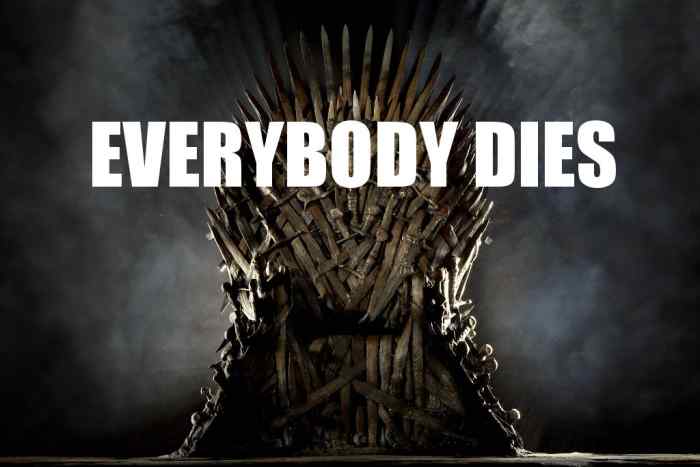
Revenge is a complex concept, both an act and a feeling, and is largely up to the perception of the person seeking revenge and the people that observe it. In the Oxford English Dictionary revenge is defined as the act of harming one’s transgressors. This caveat is what makes revenge acceptable and elevates acts of violence from simple, chaotic deviance to lawful and just action in the eyes of many.
The prevailing attitudes about revenge in American society can be seen in everything from the way our justice system works to the types of television shows that we watch. Since we are not able to stone or murder those who harm us or our families in today’s culture, some people get satisfaction from seeing those who have committed heinous crimes put to death by electrocution or by lethal injection. When the law fails to end the lives of these people, revenge is sometimes taken by other prisoners. For example, Jeffrey Dahmer, a murderer, cannibal, and necrophile, was bludgeoned to death by another prisoner after he was sentenced to fifteen consecutive life sentences, rather than to death. After Osama Bin Laden was killed by Navy Seals in 2012, people all over the nation spontaneously erupted in celebration. Chants of “U.S.A!” and euphoric joy over the death of a man that very few Americans had ever met, but who was established as an enemy who directly hurt our country. For many Americans, this felt like sweet revenge. Now, Osama’s son, Hazma Bin Laden, has vowed to seek revenge against the United States for his father’s death — continuing the cyclical nature of vengeance.
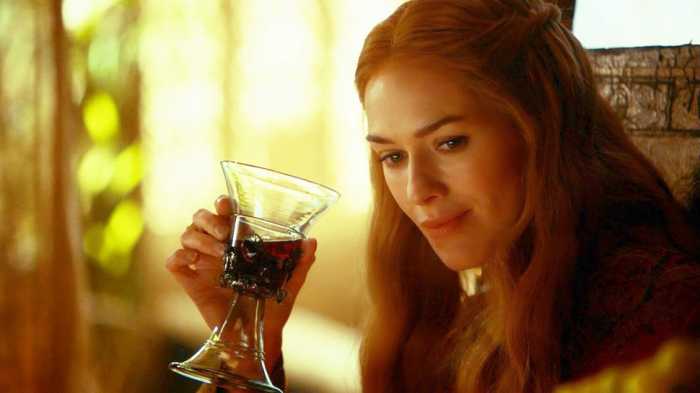
Because of these factors, and the American appetite for revenge, it is not surprising that revenge is further glorified in Game of Thrones when compared to Martin’s A Song of Ice and Fire. Game of Thrones is one of the most popular shows in the United States, with the audience growing twenty-five percent after the latest season (which focused heavily on the revenge of several characters and groups of characters), and with ratings beating out The Walking Dead and other popular television series. In the sixth and latest season, we see several scenes of bloody revenge that have not happened, or happened differently, in the novels: Arya Stark’s murder of Walder Frey, one of the orchestrators of the “Red Wedding” where her mother and brother were murdered, Cersei Lannister’s torture of Septa Unella the “shame nun” who tormented her in the previous season, and Sansa Stark killing her husband Ramsay Bolton by way of his own dogs. The addition of these scenes, which were fan favorites, and seemed to leave viewers feeling satisfied the removal of certain scenes and plotlines, such as Lady Stoneheart (the zombified Catelyn Stark and a character that shows the negative effects of revenge who kills Freys and Lannisters based only on their family name, hangs fan favorites Podrick Payne and Brienne of Tarth who were allied with Catelyn) is not present in the show at all. This really showcase the HBO series’ glorification of revenge. Instead, the scenes of revenge we view have the same underlying message — that they deserve it, a motif often seen in American media.
Given the very human desire for revenge, it is not surprising that this theme is so prevalent in the gritty, morally grey world of Westeros. From the personal, passionate “in the moment” scenes, to the cold and calculating revenge of Arya, to the impersonal and broad vendettas between entire families in the series, it is safe to say that a lot of the action of the novels and television show are put in motion by the desire for revenge. The changes in the way that revenge is presented between the book and show, are where we can truly see a reflection of our society.
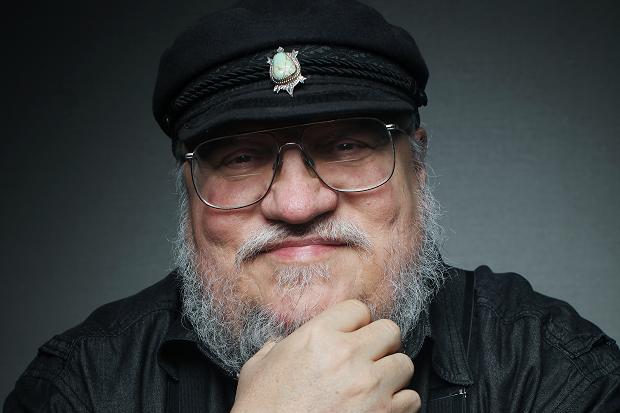
Revenge scenes in film and literature can be cathartic and satisfying, but by removing the nuanced and subtle “grey area” of morality and reflection of the motivations of characters on both sides of a conflict, Game of Thrones removes what makes A Song of Ice and Fire’s revenge scenes so satisfying as well as meaningful. In both Game of Thrones, and A Song of Ice and Fire, the revenge scenes that we see generally fall into three categories. There are the cold, calculated and long thought out plans: Arya joining the Faceless Men. The quick, brutal revenge scenes where someone takes advantage of a chance to exact revenge on someone who has hurt them: Sansa’s revenge on Ramsay. And the intense but impersonal vendettas that span over entire families or even cultures — for example, Daenerys’s desire to get revenge against the “usurper’s dogs” or the Starks, Baratheons, and Lannisters that killed her father and cast her family out of Westeros and off of the Iron Throne. These categories span the show and the books, but the changes between the two medias can be drastic and change their meaning and tone dramatically.
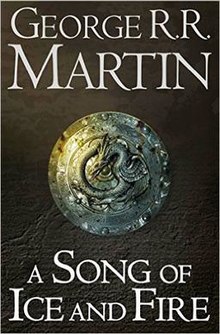
One of the best examples of the changes between the book and show and their consequences can be seen in Ellaria Sand, Oberyn Martell’s paramour, and his bastard daughters known as the Sand Snakes. In the both the book and the show, The Sand Snakes want to get revenge for the death of their father — a death which was caused by Oberyn himself seeking revenge for the death of his sister Elia at the hand of Gregor Clegane or “The Mountain That Rides.” Oberyn championed for Tyrion Lannister (who was on trial for the death of his nephew) in trial by combat, against Gregor, taking advantage of the trail as an opportunity to get revenge for Elia’s death. Although Oberyn’s death is violent and distressing in both forms of media, it is within the law in Westerosi culture, and it’s something that Oberyn knew was a possibility when he agreed to be Tyrion’s champion. In the books, Ellaria is one of the loudest voices speaking against violence and revenge, delivering an emotional and poignant speech to Obara, Nymeria, and Tyene when they express their desire to avenge their father’s death. After they call the death of The Mountain “the beginning” Ellaria begs them not start a war, asking “Where does it end? … Can I take a skull to bed with me, to give me comfort in the night? Will it make me laugh, write me songs, care for me when I am old and sick?” (Martin “The Watcher”) while looking at the skull of her husband’s killer. This speech is emotional, and makes the reader think twice about the motivations of other characters, and feel almost guilty for their happiness at the deaths of others.
Compare this to Game of Thrones’s version of Ellaria, and the difference is glaring. This Ellaria immediately agrees with the Sand Snakes’ desire for vengeance and goes out of her way to hurt anyone even vaguely associated with the death of Oberyn. Going against what Oberyn himself said “We do not hurt little girls in Dorne,” (Game of Thrones “The House of Black and White”) Ellaria poisons Myrcella Baratheon — an innocent young girl in no way a part of Oberyn’s death. She and the Sand Snakes go on to murder their own blood — Oberyn’s brother and his son, because they do not agree with their revenge plot. The Dorne plotline on the show has been often used as an example of the perils of adaptation and lazy writing in Game of Thrones, and this is not without reason.
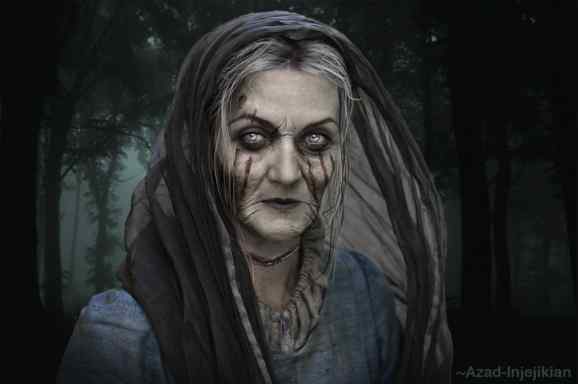
The lack of Lady Stoneheart in the television adaptation is another hugely telling part of the differences between the novels and show. In the books, we are introduced to Lady Stoneheart — formerly Lady Catelyn Stark of Winterfell. Catelyn meets a violent end, with her throat cut by the Frey’s (her house’s former bannermen) at the infamous Red Wedding and thrown naked into a river in a mockery of her house’s funeral rites. Her appearance is startling and frightening, and she is a creature motivated purely by revenge. This desire has corrupted The Brotherhood Without Banners, who once mainly focused on helping the smallfolk, but now (under her orders) look to hang anyone who could be seen as a Lannister or Frey collaborator. All that she does is in search of revenge — meticulously combing the Riverlands with The Brotherhood without Banners and looking for anyone with sigils to represent that they may owe allegiance to the people that killed her and her son. Lady Stoneheart is vastly different from Catelyn Stark, losing her instinct for forgiveness and replacing it with bottomless rage. She tries to hang Brienne of Tarth, who was sworn to her in life, simply because she carries a Lannister sword — and Brienne was looking to protect and save Catelyn’s daughters. (Martin “Brienne VIII”) Seeing what has become of the reanimated Catelyn really drives home the potential negative effects of seeking revenge, and shows that vengeance only leads to more pain and death. The fact that this character is not at all in the show (and it is fairly safe to say that she will not be, now that the show is far ahead of the books and there have been no references to her), is telling of the show runner’s views on revenge — removing Lady Stoneheart, who condemns revenge entirely, and rewriting Ellaria to be a cartoonishly villainous version of herself speak volumes of what the directors believe our society values.
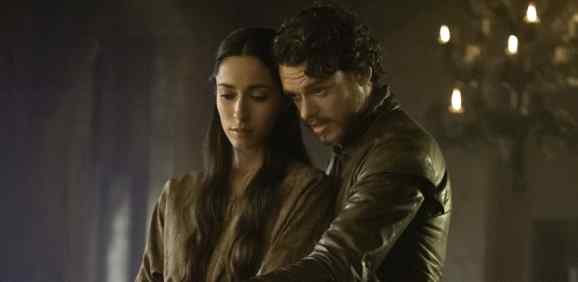
Another huge divergence between book and show that left many fans of both upset was in the Winterfell plotline. In the books, Sansa is still in the Eyrie with Petyr Baelish under the alias of Alayne Stone and is still a virgin or “maiden”. In the show, she has been repeatedly and brutally raped by her husband, Ramsay. After escaping, her response is to exact revenge on him when the opportunity arises. She has Ramsay tied to a chair and eaten by his own dogs. This revenge scene is incredibly satisfying to the viewer because we see a character who has been hurt and abused since the first season overcoming and having revenge on a character that was given absolutely no redeeming features. He is only shown as sadistic and evil, unlike many other “villains” on the show that are given some type of humanity. This changes Sansa’s character drastically — in the books, she is never raped, but she does still suffer mental and physical abuse at the hand of her betrothed, Joffrey, and is never able to get revenge for these actions. However, she does witness his gruesome death and, despite what one might think, is not satisfied and pleased with it and more or less expresses the same sort of sentiments as the Ellaria of the books that his death did nothing to bring back her father, or undo the pain that Sansa was forced to go through.
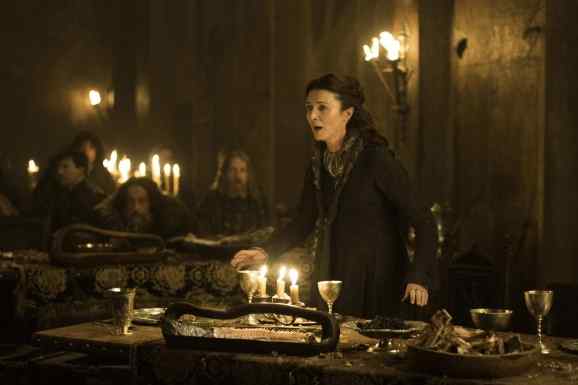
The changes made between A Song of Ice and Fire and Game of Thrones highlight the innate human desire for revenge that goes beyond the conscious and into subconscious thought. It is this desire for push and pull, tit for tat, that drives a lot of social interactions in complex societies. Giving into this very human, but not necessarily moral, desire can feel good to the viewer, and that is why the theme of revenge comes up so often in art and life. However, it is important to be critical and think deeply about why we like seeing revenge enacted upon others, what the cost can be of pursuing revenge, and what it means to the individual and to society. Although the prevalent attitude about revenge is that it will lead to catharsis and the ability to “let go,” this may not be necessarily true. As shown in three studies done at Harvard University, those who do engage in revenge often have a harder time “letting go” and will spend more time and energy thinking about the person that they took revenge upon. People also have a difficult time differentiating the relative difficulty between actually acting vengefully against another person opposed to viewing punishment done by someone else (such as legal punishment or the death penalty). Because of the paradoxes associated with seeking and watching revenge, it is necessary the media we consume associated with revenge be thought provoking and show both the benefits and consequences associated with seeking revenge. A Song of Ice and Fire does so masterfully, while Game of Thrones falls short at many points.
What do you think? Leave a comment.











I really don’t like how Arya’s revenge is portrayed in the show after season 5. Seems like the showrunners were trying to make him Kill Bill type of character. I honestly cringed when she killed Meryn Trant (they made him a pedophile just to make sure he’s a bad guy) and all the Freys.
The point of her character is that she’s so utterly rooted in hatred and revenge in such young age to the point where she’s verge of losing her humanity and that she won’t be truly happy until she gives up on revenge. I believe that she’ll meet Sandor again and forgive him.
I would love it if Theon got to kill Ramsay in the books. Ramsay starts trying to get him to back down, calling him “Reek”, and Theon smiles and says “My name is Theon Greyjoy, bastard.” and kills him.
The most interesting part for me is that the show doesn’t show the bigger picture, mainly due to the exclusion of Brienne’s book story and Arianne’s. They would show that revenge, no matter how justified, always results in a pile of corpses.
The show has the viewers rooting for the northmen while not showing the atrocities they committed. Its morality is way too simple and as a result makes me hate that aspect of it. In a similar way, the Lannister men are shown to be as evil as in the book, so that Tywin can be a bad guy. In the show I’m pretty much the only one who mourned for all the innocent Freys. The show portrays revenge as a virtue and a show of badassery, where it should really be shown to be what it is: a giant dick-measuring contest where the winner is who can kill the most peasants without flinching or caring.
The show basically got rid of any grey characters, mostly it’s just good or bad, which is lame.
With Brienne and her revenge on Stannis, I wish it had an impact on her story, she gave up the chance to save Sansa to kill Stannis. But nope she able to kill him and find Sansa with ease.
Also it’s not like all the Frey were in on the red wedding, and those that did didn’t have much of a choice. It was either helped with the wedding or be kicked out of the twins.
The Hound, Jaime, Theon, and Cersei are all still on the show. People still debate their actions, I still know people who only watch the show that have a hard time with Jaime.
The show is not going to be able to portray every side character. I really don’t know how anyone can expect the show to portray everything that is in the books.
Logistics apart I think ellaria doing twisted murderous things due to loss of her love and for revenge work better on a show than a dramatic verbal appeal to peace.
What are you talking about?
The show showed Brienne killing Northmen because they committed atrocities, they showed Northmen betraying the Starks. The audience don’t root for Northmen, they root for the Starks just like a lot of book readers do.
The show also shows Lannisters as just normal soldiers as well. I’m not sure how you forgot about the Ed Sheeran scene.
Also it always comes down to this, but the show is not going to have enough time to portray every storyline from the books.
Well Brienne was only killing northmen after Robb died and he wasn’t the main protagonist. A lot of book readers do love the Starks, but that’s not a thing the books deliberately want the reader to do, but to think that everyone is a crappy person. Also I didn’t see Ed Sheeran because I haven’t watched the show since season 5. I saw a clip of it but it was really dumb.
I suspect GRRM can effect empathy for the Dothraki via Daenerys’s blood riders and servants who have been with her from the start. Even if they don’t lose people close to them they’d likely be troubled by the destruction of Vaes Dothrak. Or he could just introduce more Dothraki drones and babies. Maybe Daenerys meets a Dothraki whippersnapper who reminds her of Rhaego.
Of course, Daenerys has been seeking revenge from the get go. Mirri Maz Duur, the Warlocks, the masters of slavers bay. Her purpose, adopted from Viserys, is one of revenge.
But you’re right that a theme of the books seems to be the tension between justice and revenge. Oberyn might be the,best example of someone who chooses revenge and suffers for it.
I think you could make a strong argument that Ned and Catelyn remain committed to an ideal of justice and fail to realize their enemies are in it for revenge. Tywin, Baelish, Lysa, Walder Frey, and Balon Greyjoy all seek revenge on the Starks but Catelyn and Ned continue to play fair or at least stay inside the confines of justice.
There is at least example of a Stark wishing for revenge which is the achieved by a Stark: Janos Slynt. Sansa fantisizes about him losing his head and Jon delivers.
Dany can be cruel and harsh when she wants to, but there’s clearly a progression between her idealistic “free the slaves” approach and her shift in the end of ADWD to “fire and blood”. I think it’s overly simplistic to say she’s always only been out for revenge.
And I just can’t square feeling like Dany’s going to far vis a vis the Dothraki with the khals raping and murdering. Like that one girl Dany tried to save only for the girl to get raped and murdered. When Dany makes good on her promise that he dies screaming, how aghast will we feel, truly?
Vengeance is one of the main themes of the story here, as the Frost poem the title is based off is about how vengeance and desire can destroy a person’s soul (the heart in conflict with itself).
I don’t think Martin will glorify vengeance at all because the point is about how it is self-destructive.
I kind of wonder if these forces of destruction (desire and revenge) are the basis for magic in ASOIAF. In the West you have vengeance personified with the Others and in the East you have desire personified with Dragons (or whatever comes from the shadow) and Planetos is stuck literally between these two opposing forces, forever hanging in the balance as these forces continually threaten annihilation.
It often seems that people expect the hero to conquer these forces somehow, to become powerful with ice and fire magic, but I wonder if instead, at the end, to ‘conquer’ them our hero must actually renounce these forces.
I think the difference is that between a complex, consistent, reasonably believable story and a story written by amateurs who aren’t capable of much beyond cheap crowd-pleasing.
I thought the show made a point when they had Arya finally choosing her family over her desperation to seek revenge. She also has a positive experience with the Lannister men for once, emphasising they aren’t terrible, just ordinary people like any one else.
Joffrey’s death was brutal in the show too and Olenna makes a point in Season 7 that she didn’t realise how bad it would be. Similarly with the death of Myrcella, Ellaria’s search for revenge (a weird reversal of her book character) results in her own daughter’s brutal death.
Sansa and Arya aren’t potrayed as good people when they seek revenge either. It’s actually really dark and terrible and both are set against Cersei’s own brutality, and the show knows that. Even if it’s satisfying for us, e.g. Joffrey’s death in the books, it doesn’t mean that they are portraying it positively that’s really our own bias.
Great post!
Seems like the writers changed tact in season seven after realizing how fucked up aryas murder of the freys’ was. The ed Sheeran scene.
And olenna got some sweet justice and even expressed remorse at what joffrey went through.
Sansa should have had an arc of finding the light again though.
Arya murders all the other Freys in the opening scene of season 7 itself though.
In the books we see what, revenge, death and murder does to people. It impacts the characters are that have drastic changes.
Arya in the show is basically a psychopath, which could have been a interesting for her character but they didn’t go that route with her. Instead she’s capable of killing with ease and it has no impact on her.
I’m also excited to see how Jon turns out in the books after he gets resurrected, as we’ve seen how Catelyn turned out and Beric even said that you loose parts of yourself every time.
What about Dareon and Raff the Sweetling? Arya killed them casually af in the books IIRC.
Yes good point, but most likely we will see an what impact it has on her later on in the books. As usually it’s not a sudden impact but one that comes later once they have time to process it, Most likely in Twow we might get a look.
I doubt George would have most characters be affected by death or killing and let it skip over Arya, unless she becomes a complete psychopath.
The books beat you over the head with the themes that war is wrong and revenge is pointless. So the show only half got it and portrayed the right ideas just not themed the same way. So in the show violence is glorified and revenge is the end goal. The show also fucked up the themes behind birthright and the right to rule. So yeah, if that’s why the show feels like fan service and books feel like moral lessons, that’s why; the show missed the point.
Not to spoil…but the recent episodes of the show certainly bear out your final comment. Martin, in the books, looks critically at the notion of vengeance: those who seek it lose their essential humanity (in Caetlyn’s case, literally). The showrunners, however, by virtue of their eight-episode season schedule, side-step the necessary character work that explores this idea in the service of providing the audience with acts of vengeance that are easily digestible surface satisfactions.
Revenge is portrayed in a ghastly way in the Game of Thrones show. Perhaps after watching a few seasons, one can become desensitized by the violence portrayed. The violence is the act of the vengeance or revenge and it is definitely more one-dimensional in the show though I could imagine the books offer more critical and illustrative interior dialogue. Game of Thrones is a show of blood. The brutality of characters like Sandor Clegane, or the death of Oberyn Martell can question the values of entertainment. Does a show need to be this bloody? The audience seeks the satisfaction of revenge and probably the best instance is Arya Stark’s murder of Walder Frey. A deserved punishment but lustful nonetheless. Obviously, in the society of Westeros with so few laws, the queen or the king become the Law and everything else is secondary. People become impassioned because they lust for power or the title of queen or king and it is when all the great figures clash like John Snow, Daenerys Targaryen, Tyrion Lannister, and Queen Cersei that we have the stage for betrayal and revenge.
It would have been excellent to have Lady Stoneheart but as you say the characters in the tv show have become shadowy caricatures with no inner conflict to drive them. As the show departs from the story arc provided by the books we have even list the essence of the rich locations of Essos. Without place to anchor the characters we’ve been sold sleek, simple and banal over layered, complex and finely constructed.
GoT is one TV series adaptation of a book that has taken a life of its own. The book provided the thrust and the show has taken off in a manner that few readers envisaged.
There’s a stark contrast (pun intended) in the portrayal on the show and in the books. A lot of character’s motivations are watered down and simplified — and so are the consequences! There are plenty of instances in the TV show when I thought to myself “why does this character care so much?”
I didn’t see Theon as redeemed; in fact, his entire death seemed like a stupid set-up. Why couldn’t Arya have intervened before he was killed? Similarly, a lot of characters miraculously survive the war despite being on the front lines.
Things like these affect larger concepts like revenge — people are driven by different motivations and morals.
If only had arya gotten to kill cersei
To really enjoy the GoT, I would have to dig in the morals of it. I enjoyed the motivations of these wonderful actors would have put in for so many hours on end
The scene of Daenerys burning Kings Landing to the ground I felt lacked true motivation and meaning of this act of revenge. I do agree that the HBO adaption has become quite a disappointment and falls short in the plot development.
I feel this scene might have been justified if she had a more significant reason to take revenge on a whole city and for her to finally snap, becoming the mad Queen.
The whole plot was extremely rushed, so the final scenes of destruction and death did not create the same feeling of justice as the other scenes above did.
I think this concept could be found in most other notable works of fiction, especially in Game of Thrones. I am frustrated with George R. Martin’s lack of voice within the HBO television show and his continuity of the book series. However, its theme of revenge drives the story and allows it to remain one of the best ever told.
The strange thing in the case of Arya is that she seems to be exempt from the consequences of revenge. Every other character that seeks out revenge is implicated in the cycle of violence that revenge begins and begets – Robb’s revenge leads to his death at the hands of the Freys who themselves are seeking revenge against him, Danerys’ journey to avenge her family causes her most loyal friends to turn against her as she becomes numb to the violence requires to continue it, etc. But Arya just succeeds. Training and debatable “plot armour” aside, every act of vengeance only benefits her, bringing her closer to home, to family, to safety rather than away from it.
Joffrey’s death was one of the most powerful moments in the books for me because it was so sickening—you couldn’t really take that much joy in it, because even as horrible as he was you were still watching a young man die horrifically in his mother’s arms. The revenge rang hollow, because it didn’t achieve anything. From what I remember (and it was a long time ago) the show did some kind of justice to that moment, but everything after that has just been a titillating, crowd-pleasing bloodbath with little to no critical thought. Justice for Lady Stoneheart!
Hey, love that you tackled a subject regarding show vs book differences that not many people have seemed to mind in the last couple of seasons. It seems that a ton of people are super on board with revenge as satisfactory, but I think it’s important to highlight how A Song of Ice and Fire is ultimately a story of consequences – a saga that is concerned with the fallout of that which is fulfilling in initial desire only. Maybe that’s why Cleganebowl felt so hollow in this finale; Sandor’s arc is reduced down to subjecting his brother to the fate that was inflicted upon himself as a child, rather than working past his rage and fighting for a more righteous purpose.
What a bad ending of this LEGENDARY story…I really hate season 8
I loved the revenge streak running through Arya. I’d say just about the only thing her and the Hound had in common was that they were driven to harm the ones that harmed them (and were pretty stubborn which made for great tension and a unique relationship between them). I
‘d like to compare her and the Hound to Jon and Ned. While Jon followed suit in Ned’s blindly honorable footsteps, we see the Hound, having taken on a father figure role to Arya, convince her in the last season to abandon her greatest desire for revenge on the Queen and save her own life.
Perhaps the contrast between Jon following in Ned’s footsteps and leading himself through more trouble than was worth it, compared to Arya accepting that there is more to life than completely embodying one emotion, was meant to show that the true danger we face as humans is not the evil of an emotion itself, but the danger of gaining pleasure from seeing its ugly acts through.
It is quite true that most entertainment media nowadays focuses on revenge, such as Game of Thrones (as you have pointed out) and The Walking Dead – both very popular shows. It does seem to be a subconscious desire, so by watching these TV series viewers seek to feed their own hidden wants for vengeance.
Revenge is generally seen as “an eye for an eye,” but that thinking only perpetuates a cycle of violence and hate, leaving no room for mercy and reconciliation. However, every situation is different and it is up to our own morals and ethics whether we can find it in our character to forgive someone for a heinous action.
A great read! It’s such a shame that so many show runners let fan service influence their writing. It often means meaningful, layered and thoughtful plots become an afterthought.
The Game of Thrones did a fine job of handling so many character motivations and still keeping things interesting. I had expected the Winter to be much stronger than it eventually turned out to be or perhaps, we were guilty of raising our expectations too much.